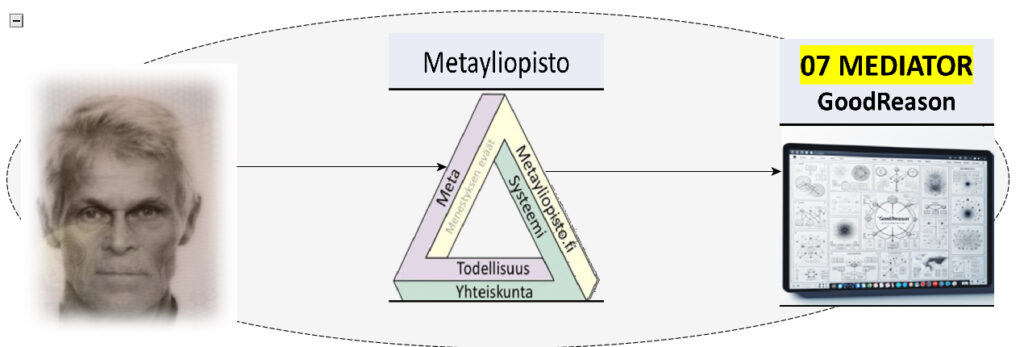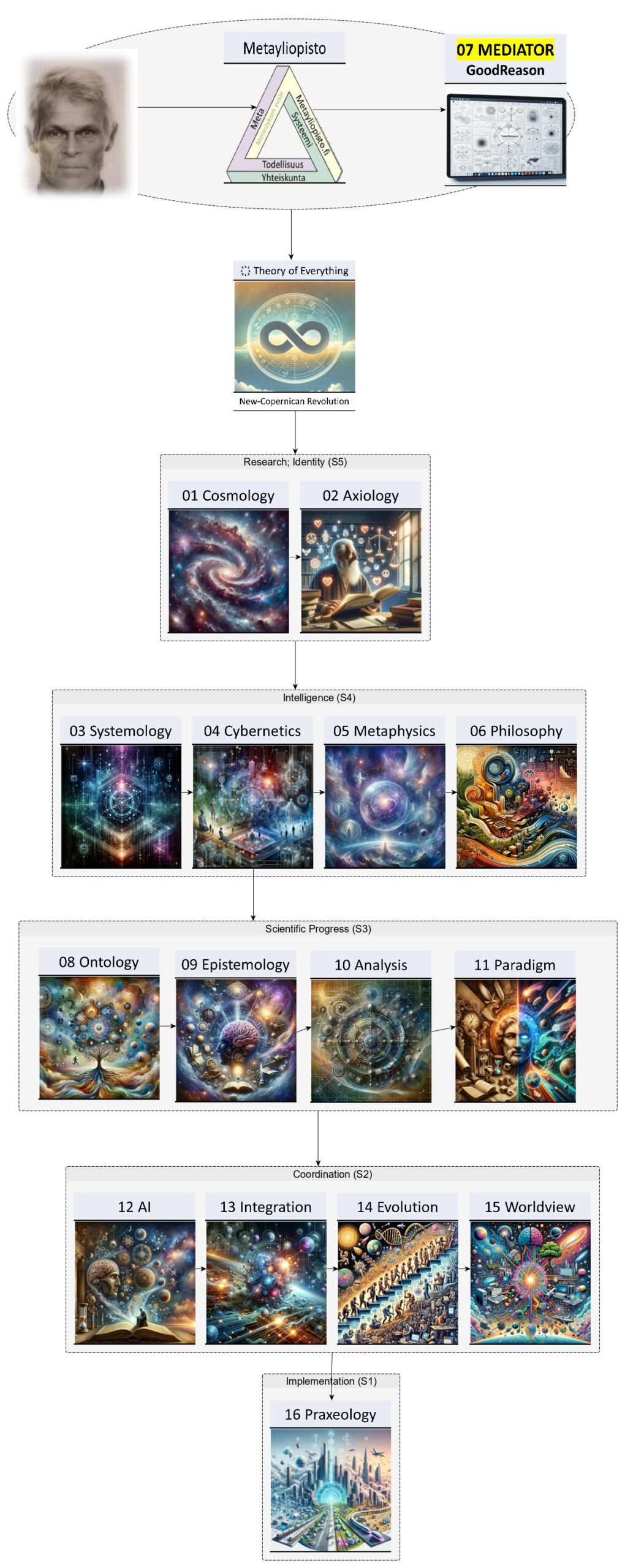Kirjantuotantoprosessimme on, valitettavasti, viivästynyt ja kestänyt yli vuoden. Hidastusta on aiheuttanut OpenAI:n valmistuminen, mikä osaltaan on elävöittänyt tuotosta ja sisältöä erittäin paljon, ja koitui eduksi. Kirjan teoria pohjautuu tieteenfilosofian ytimeen lukujen otsikkoja myöten (ohessa kuva). Näin syntyy metameta-taso, kuvaus metatieteen konseptista palvelemassa kaikkea.
In English:
Unfortunately, our book writing process has been delayed and lasted over a year. The slowdown has been caused by the completion of OpenAI, which on the other hand has greatly enlivened the output and content. The theory of the book is based on the core of the philosophy of science, right down to the titles of the chapters (picture attached). OpenAI has provided for chapters the symbolic figure with definitions, images, behavior model and more. This is how a completely new construction, the meta-meta level, is born, a description of the concept of metascience serving and studying everything.
The attached summary is a draft made by AI, not an actual table of contents.
Brief Overview
- Title: “New-Copernican Revolution by Systemic Theory of Everything“
- Author: Eki Laitila
- Themes: Integrates multiple disciplines to form a metascience including metadisciplines, inspired by Cybernetics. Focuses on rapid learning methods, inter-, trans- and metadisciplinary understanding, and systemic visualization with conceptualization techniques.
- Audience: Academics, students, IT and AI professionals, and those interested in crowdsourcing methodologies.
- Purpose: To offer a comprehensive framework that accelerates understanding and application of various disciplines.
Detailed Summary by Chapter
- Ontology:
- Explores the nature of existence and reality.
- Emphasizes the link between information and being.
- Key Takeaway: Understanding fundamental structures through an ontological lens.
- Paradigm:
- Investigates the framework of theories in scientific disciplines.
- Highlights historical paradigm shifts.
- Key Takeaway: Paradigms shape our interpretation and understanding of the world.
- Analysis:
- Focuses on techniques for breaking down complex concepts.
- Emphasizes analysis in problem-solving.
- Key Takeaway: Critical analysis as a fundamental skill in various disciplines.
- Cybernetics:
- Studies regulatory systems and structures.
- Application in AI, biology, and social sciences.
- Key Takeaway: Cybernetics as a tool for understanding complex systems.
- Integration:
- Discusses the application of science in design and construction.
- Bridges theory with practical application.
- Key Takeaway: The role of integration in technological and societal advancement as well as in AI, with unification and inference and protocols.
- Evolution:
- Covers the development of systems and organisms.
- Applies evolutionary principles beyond biology.
- Key Takeaway: Evolution as a driving force for change and progress.
- Artificial Intelligence (AI):
- Explores AI development and impact.
- Discusses AI’s role in various sectors.
- Key Takeaway: Ethical and societal implications of AI.
- Worldview:
- Examines perspectives on life and the universe and culture.
- Interplay between scientific advancements and worldview.
- Key Takeaway: Worldviews influence our understanding and interpretation of reality.
Practical Applications
- Interdisciplinary Approach: Encourages combining insights from various fields for a holistic understanding.
- Systems Science and Cybernetics: Showcases practical examples, emphasizing their relevance in problem-solving.
- Models and Visual Aids: Around 100 model diagrams and 100 images enrich understanding and engagement with content.
Extended Exploration Topics
- Rapid Learning Techniques: Methods for quickly mastering complex subjects.
- Crowdsourcing Applications: Utilizing systemic and visualization methods in crowdsourcing.
- Technological Innovation: How systemic thinking fosters innovation in technology.
- Ethical Considerations in AI: Exploring ethical dilemmas and solutions in AI development.
- Evolutionary Theory in Modern Contexts: Applying evolutionary principles in contemporary settings.

The best is yet to come. We can wait.
Happy regards 🙂
Eki Laitila, PhD on IT (Symbolic Analysis), Metayliopisto – forum
